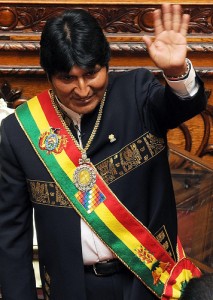Amid a strike by workers seeking better pensions, Bolivian lawmakers approved legislation that allows President Evo Morales and his Vice-President Álvaro García Linera to seek another term in the December 2014 elections.
The country's Constitutional Tribunal (TCP for its initials in Spanish) had cleared the way for Morales’ re-election at the end of April 2013, when it declared [es] that four of the six articles in the law -including the article that allows for Morales’ and Linera's re-election- are constitutional. As Emily Achtenberg explained in the NACLA blog Rebel Currents,
The court ruled that Morales could seek a third consecutive term, even though the 2009 Constitution allows only two, on the grounds that his first election (in 2004) took place under a previous constitution. The ruling dismissed a clause in the new Constitution stating that any prior mandate must be taken into account in computing the allowable term. This transitional provision, the court reasoned, does not apply to Morales because his original mandate did not carry over into the new Constitution (instead, Morales cut his first term short by one year and was re-elected in 2009 under the new Constitutional regime).
Emily also pointed out that critics say the President “should have sought a Constitutional amendment before running for a third term.”

President Evo Morales taking office in La Paz on January 22, 2010. Photo shared on Flickr by Presidencia de la República del Ecuador (CC BY-NC-SA 2.0)
While Morales’ supporters celebrated the court's decision, others, like Bolivian bloggers Andrés Gómez Vela [es] and Eduardo Bowles [es], criticized it. Andrés said that the court's judges have failed the test in this key issue, while Eduardo wrote that from a legal point of view the decision to accept a third presidential bid is one of the biggest setbacks in the process of the country's democratic constitution. Furthermore, Eduardo warned that the decision could trigger a new period of instability.
Emily in Rebel Currents added,
Based on current polls, which give Morales 60% support in the departmental capitals and 76% in rural areas, a referendum in favor of a constitutional amendment would likely have prevailed. In avoiding the constitutional route, critics argue, Morales deceived not only the then-political opposition, but the Bolivian people, who voted to support the consensus Constitution, including its term limits compromises, by a margin of 61%.
For the upcoming election, Morales has publicly announced that he hopes to achieve an ambitious mandate of 74%, topping his previous votes of 54% in 2005 and 64% in 2009.
However, Bloggings by boz argued that despite his popularity Morales shouldn't run:
Should he run? Probably not. Mistakes or simply bad economic luck in his third term will tarnish his legacy and harm the changes he has already made. Additionally, in running for this third term, Morales is making the same mistakes as Hugo Chavez. He is relying on his personal leadership instead of building up institutions and other ideologically-similar leaders to carry on his work. Any movement or country dependent on a single individual lacks resiliency.
Bolivians will go to the polls to elect a new president in December 2014. In the meantime, netizens are worried about the escalating tension caused by the current strikes and protests, a conflict that could affect President Morales’ chances of winning his third presidential election.







2 comments
Dick Move #33: “That Term Didn’t Count”…
Does anyone here know how to get around a two-term presidential term limit? Anyone, anyone? Yes, you in the corner. Evo, isn’t it? Looks like you have an idea. Ah yes, Evo, my fiesty buddy from Bolivia. I figured you’d…